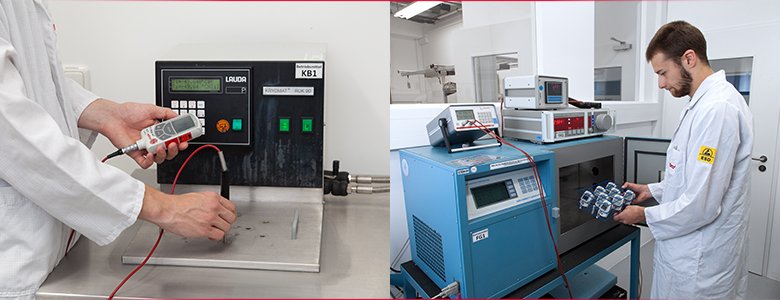Accredited DAkkS-calibration laboratory
Our range of services:
- Accredited calibration according to DAkkS guidelines temperature: -90 °C … +250 °C
- Accredited calibration according to DAkkS guidelines humidity: 10 % … 95 % at +5°C…+70 °C
- Accredited calibration according to DAkkS guidelines pressure: 0 mbar...25.000 mbar
- ISO-calibration temperature: -90 °C...+250 °C, +250 °C...+1000 °C
- ISO-calibration humidity: 10%...95% at +5°C...+70 °C
- ISO-calibration pressure: 0 mbar…10.000 mbar
- ISO 9001 certificate PDF-Download
- DAkkS accreditation certificate D-K-20615-01-00 download
Calibration of external devices (all products possible)
We also perform on-site calibrations at your location! Please contact us for further information.
Differences Between Factory Calibration Certificates
For the purpose of documenting system accuracy and the stability of factory products, so-called factory calibration certificates are prepared and enclosed to the respective product. Even in the case where the product is, as an example, a part belonging to a measuring chain, the respective manufacturing company is obligated to provide such certificate. This is due to the fact that, in this case, the product is subject to explicit requirements with respect to the traceability in relation to the reproduction of measuring results.
Regarding the above, the factory calibration certificate is issued in particular for quality assurance purposes for the respective user because measurement insecurity may be reduced on the basis of information about possible existing deviations which occurred while the product was measured. However, it must be taken into account that factory calibration certificates do not fulfil the formal requirements provided for by DAkkS and/or ISO certificates.
Within the framework of a DAkkS and/or ISO certification process, independent testing centres examine the calibration of products and/or systems. During this certification process, the calibration results emerging from this will be documented in addition to the relevant information and data.
The following differentiations must be taken into consideration in this respect:
DAkkS Certificates:
This certificate is issued by Deutsche Akkreditierungsstelle GmbH (DAkkS GmbH – German Accreditation Centre), an institution which authorises calibration and testing laboratories to perform accredited calibration processes on the condition that they provided evidence of a sufficient level of competence. In this case, it is compulsory to perform such calibration processes in compliance with the provisions under DIN EN ISO 17025 and the respective results have the second-highest level of reliability; only government institutions have a higher level of reliability. In Germany, the PTB (Physikalisch-Technische Bundesanstalt – German National Metrology Institute) has the role of such government institution. The results from these calibration and testing laboratories are recognised as binding also within the framework of court proceedings. In addition, they apply on international level and they are generally accepted. This is possible thanks to the DIN EN ISO/IEC 17025 accreditation standard and/or guideline which is applicable in all countries as well as thanks to international agreements.
In general, DAkkS certificates provide for a high level of security with respect to the employed testing materials in the areas of testing laboratories, experts and factory and/or usage standards. Regarding the employment of measuring devices in particular, DAkkS certificates represent the perfect solution for the respective user in the case where accuracy, reliability and security are very important aspects for them.
ISO Certificates (Factory Certificates):
Industrial companies as well as financial companies, retailers, service providers and, amongst other things, hospitals are obligated to implement quality management systems as a part of the company management. This is to ensure that both the system/process quality and the product quality is monitored and optimised. To some extent, these quality assurance systems have already been certified as early as 1987.
In addition, the automotive sector (VDA, ISO TS 16949, QS9000), the pharmacy sector (CFR, GMP), the medical engineering sector (ISO 13485) and the food industry (HACCP) have all implemented industry-specific standards, guidelines and legal provisions. In this respect, the respective calibration process is required within the framework of implementing and maintaining effective testing material management. To the extent to which the requirements according to the guidelines and/or standards on the basis of VDA, GMP, CFR, HACCP, QS9000, ISO 9001:2015, ISO 10012-2003, ISO TS 16949 as well as ISO 13485 must be fulfilled, ISO certificates may replace DAkkS certificates. Consequentially, ISO certificates, compared to DAkkS certificates, represent a cost-effective alternative. The minimum content of these ISO certificates is not determined on the basis of the law; however, a summarised checklist issued by the German Accreditation Centre provides for all of them.
Tel.: +49 841 95478-0
Fax: + 49 841 95478-80
E-Mail: ebro@xylem.com

